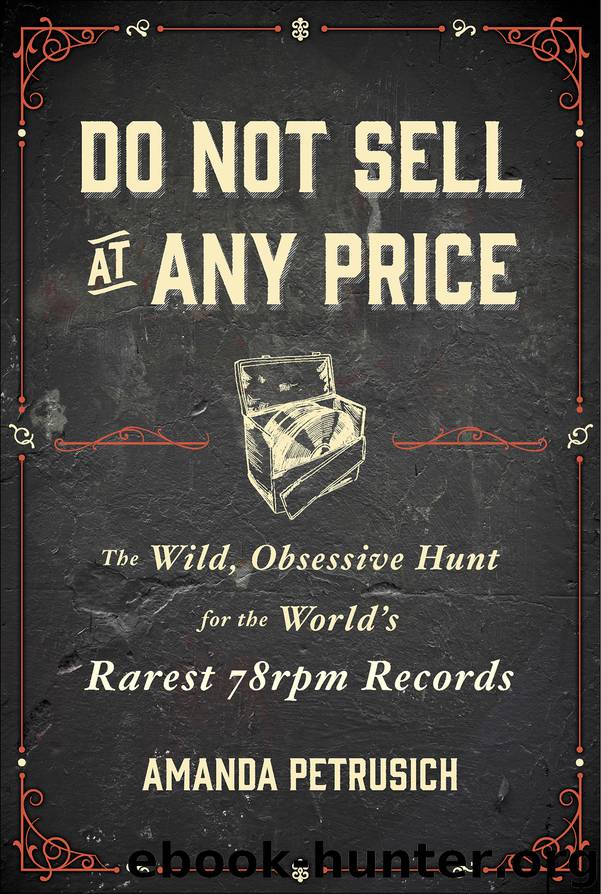Do Not Sell At Any Price by Amanda Petrusich

Author:Amanda Petrusich
Language: eng
Format: epub
Publisher: Scribner
/ / Ten / /
I Saw America Changed Through Music
Harry Smith, The Anthology of American Folk Music, Tinctures, the Celestial Monochord, “Anything Shaped Like a Hamburger,” Allen Ginsberg, the New York Public Library, 50 MILES ELBOW ROOM
In 1952, eight years after James McKune ferried “Some These Days I’ll Be Gone” back to the Brooklyn YMCA, a twenty-nine-year-old collector named Harry Everett Smith squirreled himself away in a two-room office at 111 West Forty-Seventh Street, chewing on peyote buttons and compiling a six-LP compendium for Folkways Records. The Anthology of American Folk Music, which was released by Folkways in 1952 and reissued on CD by the Smithsonian in 1997, was culled exclusively from Smith’s 78 collection and contains only songs issued between 1927 and 1932, that fruitful five-year span between the advent of electrical recording and the apex of the Great Depression. Despite its self-imposed parameters, Smith’s anthology is generous in its definition of folk music: child ballads, spirituals, Alabamans playing Hawaiian steel guitar, fiddlers, Charley Patton as the Masked Marvel, Appalachian coal miners, Cajun accordionists, the Carter Family, jug stompers, string bands, church congregations, and Uncle Dave Macon—mouth open, banjo wedged behind his knee, hollering “Kill yourself!”—all appear. Taken as a whole (and that’s the entire point), the Anthology is a wild and instructive portrait of a young country working itself out via song.
It’s also deeply confounding. There are times when I have clung to it as a kind of last hope, believing that it’s an object that unlocks other objects; there are other times when I have found it solipsistic and nonsensical and inherently ill conceived. Whatever the Anthology offers, it’s not revealed quickly.
Like most serious collectors, Harry Smith got going early. The arc of his life is both predictable—as if, like a river, it could have only ever led to one place—and meandering. He was born on May 29, 1923, the son of a boat captain and a schoolteacher, theosophists who encouraged his burgeoning interest in ethnography. He spent a good chunk of his high school years studying the tribal ceremonies of the Lummi Indians in his hometown of Bellingham, Washington, and started amassing 78s around the same time. The first one he bought was by Tommy McClennan, a rough-voiced blues singer who recorded in Chicago in the early 1940s. (“It sounded strange and I looked for others,” Smith later said of it.)
In his early twenties, Smith was just undersized enough to be able to crawl inside the fuselage of an airplane, and after six months working for Boeing as an engine degreaser, he decamped to San Francisco, then Berkeley, and finally New York City, where, in desperate need of cash for things like food and shelter, he tried to pitch his record collection wholesale to Folkways Records. Instead, cofounder Moe Asch persuaded him to produce a multidisc compilation for the label. Asch’s biographer, Peter Goldsmith, suggests that Smith’s “appearance and manner” might have reminded Asch of his pal and partner Woody Guthrie, another charmingly arrogant polymath who recorded for Folkways in the 1940s.
Download
This site does not store any files on its server. We only index and link to content provided by other sites. Please contact the content providers to delete copyright contents if any and email us, we'll remove relevant links or contents immediately.
The Goal (Off-Campus #4) by Elle Kennedy(13657)
Kathy Andrews Collection by Kathy Andrews(11812)
Diary of a Player by Brad Paisley(7564)
Assassin’s Fate by Robin Hobb(6200)
What Does This Button Do? by Bruce Dickinson(6195)
Big Little Lies by Liane Moriarty(5790)
Altered Sensations by David Pantalony(5094)
Pale Blue Dot by Carl Sagan(4996)
Sticky Fingers by Joe Hagan(4188)
The Death of the Heart by Elizabeth Bowen(3611)
The Heroin Diaries by Nikki Sixx(3543)
Confessions of a Video Vixen by Karrine Steffans(3301)
Beneath These Shadows by Meghan March(3300)
How Music Works by David Byrne(3262)
The Help by Kathryn Stockett(3139)
Jam by Jam (epub)(3077)
Harry Potter 4 - Harry Potter and The Goblet of Fire by J.K.Rowling(3061)
Computational Linguistics and Intelligent Text Processing: 20th International Conference, CICLing 2019 La Rochelle, France, April 7â13, 2019 Revised Selected Papers, Part I by Alexander Gelbukh(2990)
Strange Fascination: David Bowie: The Definitive Story by David Buckley(2863)
